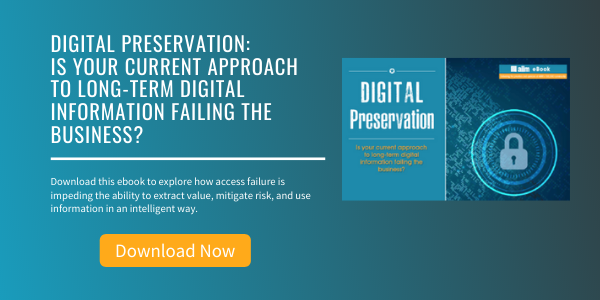
We Put a Man on the Moon, Yet Digital Preservation Is Still an Issue
Monday marks the 40th anniversary of Neil Armstrong's first steps on the moon.
For people of my generation, this is one of the few "you can always remember what you were doing" events that were actually positive. I still remember sitting in front of our television, diligently following the instructions from the newspaper on how to take a photo from the TV. (My kids would ask, "Why didn't you just DVR it, Dad?") The anniversary seems all the more highlighted with Walter Cronkite's passing this weekend.
The anniversary highlights a couple of themes for me; some document management related and some not.
First, thinking about the lunar landing and Walter Cronkite's role in it reminds me how completely the nature of journalism has changed in the past 40 years. Technology has changed the nature of journalism from a one-to-many business in which the obstacles to entry were massive and content was controlled by a few, to a many-to-many business in which anyone with a flip video camera can reach millions. No journalist will ever have the power of a Walter Cronkite again, which seems like a good thing. Then again, the world seems a little more hostile and callous without the Uncle Walters of the past. We now often rely on a chaotic network of bloggers and glorified paparazzi for "news."
Secondly, the anniversary reminds me of a recent article on the perils on managing and preserving physical information. Of course, we all know about the perils of digital preservation - more on that in a minute - but there are also challenges and risks in the management of physical assets (in this case, tape, but also paper records). According to NPR, "An exhaustive, three-year search for some tapes that contained the original footage of the Apollo 11 moonwalk has concluded that they were probably destroyed during a period when NASA was erasing old magnetic tapes and reusing them to record satellite data. 'We're all saddened that they're not there. We all wish we had 20-20 hindsight,' says Dick Nafzger, a TV specialist at NASA's Goddard Space Flight Center in Maryland, who helped lead the search team."
Third, I am struck by the application of technology to restore -- and more impressively, enhance -- information from the past. The image above is from an enhanced and restored version of the Neil Armstrong "first step." Check the NPR video out here.
Lastly, the lunar landing anniversary brings to mind all the stories about poor digital preservation practices and the inability to access records and data from the original Apollo and moon flights. Digital Preservation is still a huge -- and often ignored -- issue in organizations. Digital Preservation is the Achilles heel of the digital revolution.
About John Mancini
John Mancini is the President of Content Results, LLC and the Past President of AIIM. He is a well-known author, speaker, and advisor on information management, digital transformation and intelligent automation. John is a frequent keynote speaker and author of more than 30 eBooks on a variety of topics. He can be found on Twitter, LinkedIn and Facebook as jmancini77. Recent keynote topics include: The Stairway to Digital Transformation Navigating Disruptive Waters — 4 Things You Need to Know to Build Your Digital Transformation Strategy Getting Ahead of the Digital Transformation Curve Viewing Information Management Through a New Lens Digital Disruption: 6 Strategies to Avoid Being “Blockbustered” Specialties: Keynote speaker and writer on AI, RPA, intelligent Information Management, Intelligent Automation and Digital Transformation. Consensus-building with Boards to create strategic focus, action, and accountability. Extensive public speaking and public relations work Conversant and experienced in major technology issues and trends. Expert on inbound and content marketing, particularly in an association environment and on the Hubspot platform. John is a Phi Beta Kappa graduate of the College of William and Mary, and holds an M.A. in Public Policy from the Woodrow Wilson School at Princeton University.



